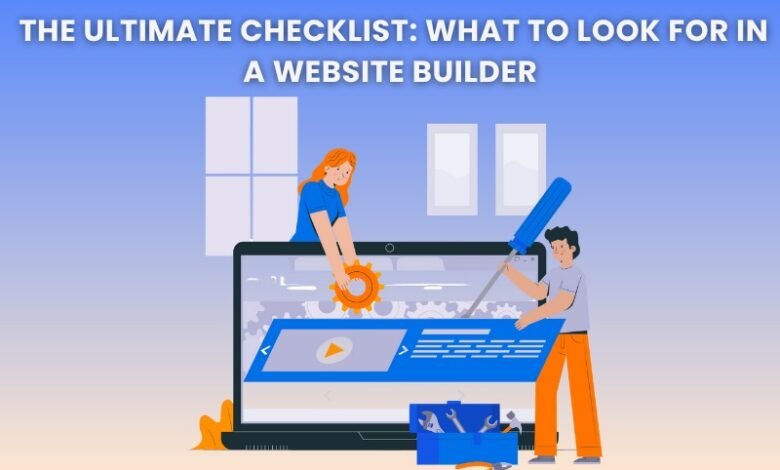The Ultimate Checklist: What to Look for in a Website Builder

Choosing a website builder can feel like a daunting task, and for good reason. The platform you select will be the foundation of your online presence. It determines how your site looks, what it can do, and how easily you can manage it. Without a clear plan, it’s easy to get lost in a sea of features and pricing plans, only to discover later that your chosen builder lacks a critical function you need.
The “best” website builder isn’t a one-size-fits-all answer. It’s the one that aligns perfectly with your unique goals, skills, and budget. To help you navigate this crowded market and make a confident decision, we’ve created the ultimate checklist of what to look for before you commit.
Use this guide to evaluate your options and build a site you’ll be proud of—without any regrets.
Ease of Use & User Experience
For anyone who isn’t a professional developer, a website builder should feel intuitive and fun to use, not like a chore. The point is to save you time and, ultimately, money.
- Drag-and-Drop Interface: Is the editor visual and flexible? Can you easily move, resize, and edit elements directly on the page without needing to touch code? Look for a true WYSIWYG (What You See Is What You Get) experience that minimizes guesswork.
- Intuitive Dashboard: Is the backend of the platform organized and easy to navigate? A clean dashboard prevents frustration and helps you quickly find settings for features like SEO, analytics, and e-commerce.
- Template Customization: Can you easily change colors, fonts, and layouts? Does the builder offer a variety of modern, industry-specific templates that you can personalize? A good builder provides a solid starting point while still giving you the freedom to make it your own.
- Onboarding & Support: Does the platform offer helpful onboarding tours, video tutorials, or a robust knowledge base to guide you? A builder who invests in good educational content wants to see you succeed.
Design & Mobile Responsiveness
Your website is a reflection of your brand. It needs to look professional and function flawlessly on any device. In a world where over half of all web traffic comes from mobile devices, this is a non-negotiable requirement.
- Template Library: Does the builder offer a wide variety of modern, attractive, and professionally designed templates? Ensure the templates are suitable for your industry, whether it’s a portfolio, an online store, or a service-based business.
- Mobile Responsiveness: All templates must automatically adjust to look great on smartphones and tablets. Critically, can you preview and customize the mobile version of your site? A good builder allows you to hide elements on mobile or adjust spacing to ensure a perfect user experience on smaller screens.
- Customization Power: Can you go beyond the basics? For advanced users, look for the ability to add custom CSS, HTML, or JavaScript to inject unique functionality or design elements not available in the core editor.
- Image & Video Handling: A good platform will automatically compress and optimize your images for faster loading times without sacrificing quality.
Features & Functionality
This is where you need to be honest about what your website needs to do—and what you might need it to do in the future.
- Blogging: If you plan to create content, look for features like a robust editor, post scheduling, commenting systems, tags, and categories.
- E-commerce: For online stores, essential features include a secure shopping cart, multiple payment gateways, robust inventory management, shipping calculators, abandoned cart recovery, and the ability to offer discounts and coupon codes.
- Integrations: Can you connect the builder to other essential tools you use? Look for native integrations with popular services like Google Analytics, Mailchimp, Zapier, and social media platforms.
- Forms & Pop-ups: Is it easy to create contact forms, surveys, or pop-ups for lead generation? A good builder offers customizable forms and pop-up triggers (e.g., on exit intent).
- Scalability: Can your website grow with you? A builder should offer different pricing tiers that allow you to easily upgrade as your traffic and feature needs increase.
Read Also: The Impact of Global Events on Ethereum price
SEO & Marketing Tools
A beautiful website is useless if no one can find it. A good website builder should have built-in tools to help you get discovered on search engines.
- Custom SEO Settings: You must be able to easily edit key on-page SEO elements like meta titles, meta descriptions, and URL slugs for every page.
- Sitemaps & Robots.txt: The platform should automatically generate and update an XML sitemap for Google. You should also have the ability to manage your robots.txt file to control what search engines can and cannot crawl.
- SSL Certificate: Does the builder provide a free SSL certificate (HTTPS)? This is a basic security feature that is also a ranking signal for Google. It’s a non-negotiable in 2025.
- Analytics: A simple way to connect your site to Google Analytics is crucial for monitoring traffic and understanding user behavior.
Pricing & Support
Your website is an investment, so you need to be sure it’s reliable and that you’re getting value for your money.
- Transparent Pricing: Is the pricing clear and transparent? Are there hidden costs for hosting, domain names, or advanced features? Compare the different plans to ensure you’re not paying for features you don’t need.
- Customer Support: What kind of support is offered? Is it 24/7? Is it via live chat, email, or phone? Read customer reviews to see how responsive and helpful their support team truly is.
- Community & Resources: Does the platform have an active community forum, a blog with tutorials, or an extensive knowledge base? These resources can be invaluable for troubleshooting and learning new skills.
Final Thoughts
No single website builder will score a perfect 10 on every single point. The key is to prioritize what matters most to you. For the creative professional who prioritizes aesthetics, Squarespace might be the winner. For the small business owner who needs powerful e-commerce out of the box, Shopify is likely the best choice. For the content creator who needs flexibility and control, WordPress.org (with a self-hosted plan) is a powerful option.
Start with a free trial, tick off the boxes on this checklist, and you’ll be well on your way to building the perfect website for your needs.



